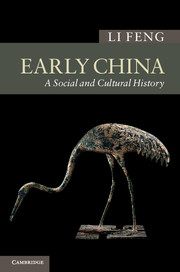Book contents
- Frontmatter
- Contents
- List of Figures
- List of Maps
- Preface
- Chronology of Early China
- Map
- 1 Introduction: Early China and its natural and cultural demarcations
- 2 The development of complex society in China
- 3 Erlitou and Erligang: early state expansion
- 4 Anyang and beyond: Shang and contemporary Bronze Age cultures
- 5 Cracking the secret bones: literacy and society in late Shang
- 6 The inscribed history: the Western Zhou state and its bronze vessels
- 7 The creation of paradigm: Zhou bureaucracy and social institutions
- 8 Hegemons and warriors: social transformation of the Spring and Autumn period (770–481 BC)
- 9 The age of territorial states: Warring States politics and institutions (480–221 BC)
- 10 Philosophers as statesmen: in the light of recently discovered texts
- 11 The Qin unification and Qin Empire: who were the terracotta warriors?
- 12 Expansion and political transition of the Han Empire
- 13 State and society: bureaucracy and social orders under the Han Empire
- 14 Ideological changes and their reflections in Han culture and Han art
- Index
- Frontmatter
- Contents
- List of Figures
- List of Maps
- Preface
- Chronology of Early China
- Map
- 1 Introduction: Early China and its natural and cultural demarcations
- 2 The development of complex society in China
- 3 Erlitou and Erligang: early state expansion
- 4 Anyang and beyond: Shang and contemporary Bronze Age cultures
- 5 Cracking the secret bones: literacy and society in late Shang
- 6 The inscribed history: the Western Zhou state and its bronze vessels
- 7 The creation of paradigm: Zhou bureaucracy and social institutions
- 8 Hegemons and warriors: social transformation of the Spring and Autumn period (770–481 BC)
- 9 The age of territorial states: Warring States politics and institutions (480–221 BC)
- 10 Philosophers as statesmen: in the light of recently discovered texts
- 11 The Qin unification and Qin Empire: who were the terracotta warriors?
- 12 Expansion and political transition of the Han Empire
- 13 State and society: bureaucracy and social orders under the Han Empire
- 14 Ideological changes and their reflections in Han culture and Han art
- Index
Summary
Preface
When Cambridge University Press’s commissioning editor, Marigold Acland, appeared in my office in spring 2006, it was clear to me that our common goal was to produce a book that could offer a first lesson about Early China to the advanced undergraduate and graduate students and any non-specialist readers. It immediately came to mind that the monumental volume The Cambridge History of Ancient China: From the Origins of Civilization to 221 BC (edited by Michael Loewe and Edward L. Shaughnessy; Cambridge, 1999) can serve as a rich introduction to Early China. However, it was also understood that the volume’s intimidating size and the essentially sinological nature of its presentation leave an immediate need for a future book that could better meet the needs of students beginning to study this critical period of Chinese civilization.
The present book certainly is not a summary of The Cambridge History of Ancient China, nor does it intend to show any resemblance to the latter work. Instead, it offers a reinterpretation of the process of formation of Chinese civilization from the beginning of farming life in China to AD 220, the end of the Han Dynasty, informed by many important new archaeological discoveries and the advances they have brought to the field over the past ten years. It would be adventurous if not considerably risky for anyone to try to write a general account of such a long period (in contrast to the short period in which one usually conducts his or her own research), thus exposing oneself to potential criticisms by scholars who have had much longer experience in certain periods or subject areas covered by the book. While this would seem inevitable, for no individual writer can be specialized in all periods, this is still a risk worth taking because a single-author book has the advantage of achieving a higher level of comprehension of the grand trends of development in a civilization. Such trends are observable only over a long span of time based on one’s deep understanding of the logic of history, a level that is often difficult to reach by a collaborative work by multiple authors who are informed by different theoretical frameworks and who often insist on opposing views. Therefore, the present book promises to be a consistent account (at least within the book) of early Chinese civilization, although it cannot and should not be the only account of it.
- Type
- Chapter
- Information
- Early ChinaA Social and Cultural History, pp. xvii - xixPublisher: Cambridge University PressPrint publication year: 2013

